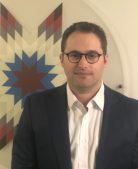After working and researching around the world, Citizen Potawatomi Nation member Raymond Orr accepted a position as an associate professor of Native American studies at the University of Oklahoma. He wanted to be back in the United States and closer to CPN following six years of teaching in Australia.
“There are few better places to study Native American politics than in Oklahoma,” he said.
He earned his doctorate in political science at the University of California, Berkeley. The Toupin family descendant then decided to write a book about his dissertation research. The University of Oklahoma Press published Reservation Politics: Historical Loss, Economic Development and Intratribal Conflict at the beginning of 2017.

Writing about tribal politics
Orr concluded his research five years ago at the end of his time at Berkeley, and he interviewed approximately 50 people. Reservation Politics focuses on the Pueblo peoples, Rosebud Sioux Tribe and Citizen Potawatomi Nation. He intended them as examples, but not representative samples, of how all American Indians think about politics.
“I tried to … make this book both a gentle introduction into the ways political scientists think about ideology, preferences and what people want,” Orr said. “But then also, the book is designed to be interesting and about Indigenous peoples and how they live their lives politically.”
“I’m not writing it from a sense of who’s right or who’s wrong or what is, it’s just how people are seeing the world.”
According to Orr, the study of political science centers on choice — how people determine the ways they live both their individual and collective lives. He examined the history of colonization and the effect it had on Native American societies and their choices.
“There was a long period of history where there wasn’t much choice about what they could do. I think we live in a time with greater choice, though there are always going to be constraints,” he said. “Greater choice for tribes is an interesting feature of the time period that we’re living in, and we hope it continues and people are making good choices, but it’s up to them to decide what that is. But that’s worth thinking about how they arrive at those choices.”
Native American political science
Orr’s interest in Native American political science began when he lived with Native students from across the U.S. while earning his bachelor’s degree at Cornell University. The different viewpoints surrounding a wide variety of things taking place at tribes everywhere inspired him. He wanted to fill what he saw as a gap in political science by studying how and why tribes arrive at their conclusions.
“If tribes vary a great deal about both how they make political decisions but also perhaps what they want, the book is about how to both understand divisions between those categories of want and then also how different experiences might inform those wants,” Orr said.
Part of the book explores the dynamics of economics and historical trauma. He suggests the two influence each other, and tribes face difficult decisions while attempting to balance excelling in modern business and honoring ancient traditions. In some groups, the rejection of today’s economic practices stems from ancestral reverence.
As an example, Orr highlights the United States v. Sioux Nation of Indians. The court case ended in the rejection of a settlement from the federal government as compensation for illegally obtaining the Black Hills, as decided by the U.S. Supreme Court. The interest-bearing account established in 1980 now holds $1.2 billion that remains unclaimed.
“Some people say, ‘No, no, we’re focusing on something other than historical wrongs.’ That we need to go forward,” he said. “Some other people are saying, ‘We need to go back and think about the way we were wronged before we can go forward.’ And that’s a pretty big distinction about what you think a tribe is, what you think politics are, what you think your experiences are, and how you understand what’s going on.”
Research and findings
While talking to tribal members for his research, he focused on a few key points including “the important political issues of a nation and reservation, what had happened there in the past and why people thought they believed what they believed.”
The varying ways tribes organize politics and the depths and kinds of expectations members held surprised him. Orr said the difficulty of meeting those expectations exists at any level of politics by nature.
Specifically, he found some Native Americans agree with their tribe’s focus on economic development. On the opposite end of the spectrum, others expressed their opinion that culture should come first or their view of tribes as a route to social services.
“Some people see a tribe as a place that they want to find healing from — emotional comfort or a sense of togetherness,” he said. “Tribes like to
be able to offer all these things, but that is difficult.”
He also found Native Americans viewpoints, desires and thoughts about their governments and societal structures vary as much as any other cultural or ethnic group. The interviews broke stereotypes about what indigenous people want or think they need more than Orr anticipated.
Orr described interacting with and learning from CPN members as part of his research as “fantastic.” He enjoyed meeting others and finding out what they consider important.
“It has been wonderful and a rare opportunity I didn’t anticipate having,” he said.
Find Raymond Orr’s book at
cpn.news/rayorr.
